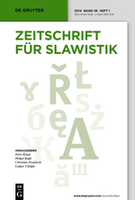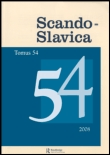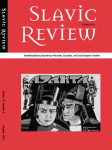
ZEITSCHRIFT FUR SLAVISCHE PHILOLOGIE
metrics 2024
Unveiling the Richness of Slavic Languages
Introduction
ZEITSCHRIFT FUR SLAVISCHE PHILOLOGIE is a pivotal journal in the field of Slavonic philology, published by Universitatsverlag C Winter Heidelberg GmbH. Renowned for its scholarly rigor and insightful contributions, this journal serves as a key platform for researchers, professionals, and students interested in Slavic languages and linguistics. Despite its classification as a traditional subscription journal, it has maintained a consistent presence in the academic community with contributions that enhance understanding of linguistic, cultural, and literary studies within the Slavic context. With an H-index reflecting its impact and relevance, the journal has historically been indexed in Scopus, ranking in the 34th and 33rd percentiles within the Arts and Humanities and Social Sciences categories, respectively. The journal has featured a range of scholarly articles from 2002 to 2017, providing a rich repository of knowledge for those dedicated to the study of Slavic languages. For any researcher aiming to delve into this dynamic field, ZEITSCHRIFT FUR SLAVISCHE PHILOLOGIE remains an essential resource.
Metrics 2024
 -
- 0.10
0.10 0.10
0.10 -
-Metrics History
Rank 2024
Scopus
JCI (Web Of Science)
Quartile History
Similar Journals

Zbornik Matice Srpske za Slavistiku-Matica Srpska Journal of Slavic Studies
Advancing Scholarship in Slavic Linguistics and LiteratureZbornik Matice Srpske za Slavistiku - Matica Srpska Journal of Slavic Studies, published by Matica Srpska in Serbia, is a prominent academic journal focusing on the diverse and rich field of Slavic studies. With an ISSN of 0352-5007 and a commitment to advancing knowledge in linguistics, literature, and cultural contexts, this journal serves as a vital resource for researchers, professionals, and students alike. Although designated as an open access journal, its significance is highlighted by its ranking in the lower quartiles of 2023 across various categories, including Q4 in Linguistics and Language and Q3 in Literature and Literary Theory. The journal's Scopus rankings further reflect its position, with a percentile of just 8th for Language and Linguistics. These factors underscore the journal's ongoing contribution to Slavic scholarship from 2019 to 2024, fostering dialogue and exploration in a field that remains crucial for understanding Eastern European cultures and languages.

Skandinavskaya Filologiya
Illuminating the Nuances of Nordic Linguistic Traditions.Skandinavskaya Filologiya is a distinguished academic journal published by St Petersburg University Press that specializes in Scandinavian philology and linguistics. With its ISSN 0202-2397 and E-ISSN 2618-9518, this journal serves as a vital platform for scholarly articles that explore the intricate languages, literature, and cultural nuances of the Scandinavian region. The journal seeks to promote interdisciplinary research and foster collaboration among linguists, literary scholars, and cultural researchers interested in the rich heritage and contemporary developments within Scandinavian studies. Although the journal operates without open access, it is committed to enhancing academic discourse and providing a valuable resource for students, professionals, and researchers. Located in the vibrant city of St Petersburg, Russia, the journal aims to bridge the gap between Eastern and Western scholarship in Scandinavian philology, making it a significant contributor to the field.

Slavia Meridionalis
Unveiling new perspectives in Slavic academic discourse.Slavia Meridionalis is a distinguished open-access journal published by the Polish Academy of Sciences, Institute of Slavic Studies, dedicated to advancing scholarly discourse in the fields of Anthropology, Cultural Studies, History, Linguistics and Language, and Literature and Literary Theory. With its ISSN 1233-6173 and E-ISSN 2392-2400, this journal has made significant strides in promoting research since its inception in 2014. Operating from Warsaw, Poland, Slavia Meridionalis aims to serve as a pivotal platform for researchers and students alike, fostering interdisciplinary collaboration and knowledge dissemination. The journal holds respectable rankings in its various categories, some achieving Q3 status, which reflects its commitment to quality scholarship within the academic community. By providing open access to its readership, Slavia Meridionalis ensures that pivotal research is readily available for the global audience, thus enhancing its relevance and impact across diverse fields.

WELT DER SLAVEN-HALBJAHRESSCHRIFT FUR SLAVISTIK
Exploring the Depths of Slavic CulturesWelt der Slaven-Halbjahresschrift fur Slavistik is a distinguished academic journal dedicated to the field of Slavic studies, published by Harrassowitz Verlag. With a focus on the rich tapestry of Slavic languages, literature, and cultural theory, this journal provides a vital platform for scholars, researchers, and students interested in the complexities of Slavic linguistics and literary expression. It operates on a semi-annual basis, encompassing converged years from 2002 to 2015 and continuing from 2017 to 2024, ensuring a continuous dialogue in an evolving academic landscape. Despite its Q4 and Q3 rankings in various categories—such as Linguistics and Language, Literature and Literary Theory, and Visual Arts and Performing Arts—its impact is noteworthy, with Scopus ranks that place it within the upper percentiles of arts and humanities fields. While currently not an open access publication, it remains an essential resource for those engaged in the interdisciplinary exploration of Slavic cultures and their global significance. The journal emphasizes innovative research and critical analysis, making it a key contribution to the ongoing discourse in Slavistics.

Studi Slavistici
Exploring the Depths of Slavic Culture and LanguageStudi Slavistici is an esteemed academic journal published by FIRENZE UNIV PRESS, focusing on the rich and diverse fields of Cultural Studies, Linguistics and Language, and Literature and Literary Theory. Since its initiation in 2004, it operates under an Open Access model, providing unrestricted access to its contents and fostering a wider dissemination of research. Based in Italy, this journal serves as a vital platform for scholars and researchers engaged in Slavic studies and beyond, encouraging interdisciplinary dialogue and innovative approaches. With its current Quartile rankings in the Q4 category across various domains, it plays a significant role in shaping dialogues within the academic community while offering insights into contemporary and historical perspectives. By maintaining an inclusive vision and engaging with critical issues, Studi Slavistici remains dedicated to advancing knowledge and scholarship in these intricate fields.

ZEITSCHRIFT FUR SLAWISTIK
Innovating Perspectives in Slavic Cultural StudiesZEITSCHRIFT FUR SLAWISTIK, published by WALTER DE GRUYTER GMBH, is a renowned journal focusing on Slavic studies, encompassing various fields such as cultural studies, linguistics, and literary theory. With its ISSN 0044-3506, this distinguished journal has been a significant contribution to the academic community since its inception in 1956, continuing to disseminate valuable research until 2024. While maintaining a strong reputation within several academic categories, ZEITSCHRIFT FUR SLAWISTIK holds a Q3 ranking in Cultural Studies and Linguistics and Language, and a Q2 ranking in Literature and Literary Theory as of 2023. This positioning underscores the journal’s impact, particularly as it caters to an audience of researchers, professionals, and students invested in the rich tapestry of Slavic culture and language. Access to this journal is not open; however, its comprehensive articles are crucial for anyone aiming to explore and deepen their understanding of Slavic linguistic and literary traditions. The journal's work is essential in fostering cross-disciplinary dialogue and advancing scholarship in these vital areas.

Scando-Slavica
Illuminating the Rich Tapestry of Scandinavian and Slavic ScholarshipScando-Slavica is a renowned academic journal published by ROUTLEDGE JOURNALS, TAYLOR & FRANCIS LTD, specializing in the rich interplay of Scandinavian and Slavic studies. With its ISSN 0080-6765 and E-ISSN 1600-082X, the journal has been a critical resource for scholars since its inception in 1954, covering a wide range of disciplines including archaeology, cultural studies, history, linguistics, and literature. As of 2023, it has consistently ranked in the third quartile across various categories, indicating its influential role in disseminating innovative research within the arts and humanities. With a focus on interdisciplinary dialogue, Scando-Slavica aims to foster a deeper understanding of cultural exchanges and linguistic connections, making it an essential read for researchers, professionals, and students interested in exploring the complexities of Nordic and Slavic interactions. While currently not an open access journal, its contributions have garnered substantial citations, bolstering its academic impact and relevance in a diverse scholarly landscape.

SLAVIC REVIEW
Unveiling the Richness of Slavic Studies.SLAVIC REVIEW, published by Cambridge University Press, is a prominent academic journal that delves into the rich tapestry of Slavic studies, focusing on the cultural, historical, and social dimensions of Slavic regions. With an ISSN of 0037-6779 and an E-ISSN of 2325-7784, this journal holds a significant position within the academic community, ranking in the Q2 category of Arts and Humanities (miscellaneous) and achieving a Q1 rating in Cultural Studies as of 2023. Notably, the journal has consistent relevance in the field, as evidenced by its Scopus rankings—Rank #260 in Cultural Studies and Rank #204 in Miscellaneous Arts and Humanities. Since its converged years starting from 1966 up to the present, SLAVIC REVIEW has been an essential resource for researchers, professionals, and students aiming to deepen their understanding of Slavic cultures. While it operates on a traditional subscription model and does not provide open access, the journal remains a vital platform for pioneering research and critical discourse in Slavic studies.

Studia Litterarum
Illuminating the Intersections of Literature and CultureStudia Litterarum, published by the esteemed Russian Academy of Sciences at the A.M. Gorky Institute of World Literature, serves as a vital platform for the exploration and analysis of literature and cultural studies. With an ISSN of 2500-4247 and an E-ISSN of 2541-8564, this open access journal has been disseminating valuable research since 2016, reaching a global audience keen on advancing the understanding of literary theory and cultural narratives. Based in Moscow, Russia, the journal has achieved remarkable academic recognition, holding a Q2 classification in Cultural Studies and a prestigious Q1 tier in Literature and Literary Theory, as of 2023. Its Scopus rankings underscore its relevance, with a notable placement in the 51st percentile for literature and literary theory and 27th percentile for cultural studies. Studia Litterarum not only opens doors to scholarly dialogue but also enhances the visibility of contemporary literary scholarship, making it an essential read for researchers, professionals, and students alike seeking to deepen their understanding of the intricate dynamics within literature and cultural studies.

Studia z Filologii Polskiej i Slowianskiej
Pioneering Research in Slavic Linguistic PhenomenaStudia z Filologii Polskiej i Slowianskiej is a prominent journal published by the Polish Academy of Sciences, Institute of Slavic Studies, focusing on the rich and diverse field of linguistics and language studies, particularly within the Slavic context. With the ISSN 0081-7090 and E-ISSN 2392-2435, this open-access journal has been a valuable resource for researchers, professionals, and students since its transition to an open-access model in 2014. It features rigorous peer-reviewed articles that contribute to the understanding of linguistic phenomena and cultural narratives across Slavic languages. Recognized within the Q3 quartile of linguistics and language in 2023, it ranks at the intersection of arts, humanities, and social sciences, providing insights that echo through disciplines such as sociolinguistics, psycholinguistics, and philology. In its ongoing publication trajectory from 2011 to 2023, Studia z Filologii Polskiej i Slowianskiej continues to foster academic discourse and collaboration, positioning itself as a key player in the global linguistic community.